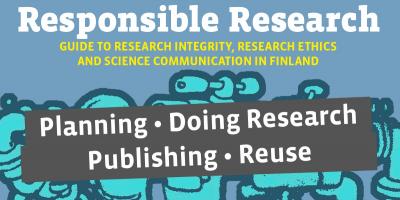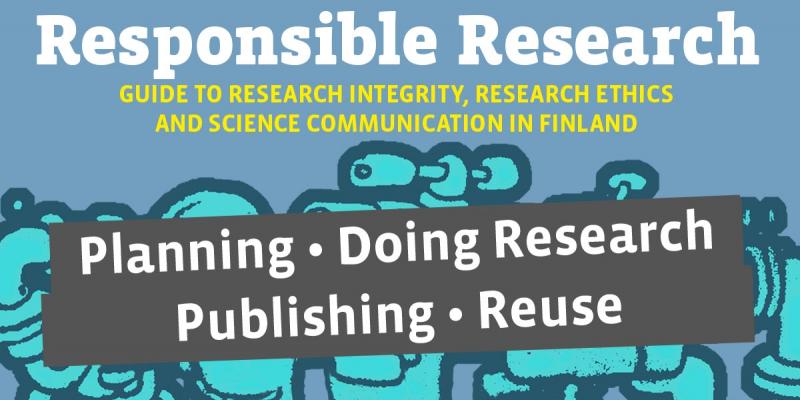A researcher can reflect on their own engagement with society through some ethical considerations.
Many researchers feel torn between meeting targets and satisfying expectations. On the one hand they should produce internationally recognised research, and on the other, they should see to it that the fruits of their research are broadly available to society. These goals need not be incompatible, but the researcher will have to make choices between them when planning how to use their time. Young researchers will also be weighing up the extent to which their various achievements and professional activities might advance their careers. The nature of societal engagement will certainly vary across different fields of science and it would be unreasonable to suppose that a researcher could be active in every possible way. Within a research team, tasks can be assigned so that individual researchers take care of a particular sector. This makes sense, since dialogue with the various stakeholders of society is also a question of skill. It takes practice and is best learned through experience. One researcher has learned to present their ideas intelligibly to an audience, while another might be good at building bridges to the business world. A third team member is at home in the world of politics whereas a fourth can deal with social media in its various forms.
Many researchers feel guilty over not having enough time to share their expertise beyond academia, as their research takes up all their time and energy. It is certainly worth stopping to think about this from time to time, because sometimes even a small effort can make a significant impact if you find the right channels. Equally, we should not forget that educating students to meet society’s needs is in and of itself a crucial means to influence society. They bring knowledge and skills to the workplace in a way that benefits everyone.
When a researcher sets foot outside the academy, it is good to be aware that the knowledge needed there is different to that among researchers. When a researcher writes for other researchers, they highlight their own findings. Whenever they have dealings with the media, ministries or corporations, they are representing their entire discipline and their task is to relay all the data the scientific community has on any given topic. And the language used changes accordingly. The discourse used within the scientific community won’t do when talking to a politician, a research director or a hall full of people who are eager to learn about the latest scientific achievements.
The ethical perspective
When a researcher is thinking of their involvement with society, they might take advantage of certain ‘pre-emptive’ ethical tools. Firstly, they can think about the subject from the ethical perspective of consequentialism and ponder what the different parties involved gain from it. In most cases, it is society as a whole that stands to benefit.
But what about the researcher? Could it have an impact on their research? And how about their faculty, university or the field they represent? What is the consequence of focusing solely on research at the expense of being active in society? Who are the winners and losers in this scenario?
Another perspective is the ethical basis for your principles. The researcher may ask themselves whether being on society’s payroll means they have to get involved in everything. Or perhaps they figure that the best way to serve the employer, which is often the state, is to focus on their research. Partnerships with businesses and engaging with policy-makers requires long-term commitment and building up networks. What portion of work time should the researcher set aside for this? Is zero hours enough?
It may be a one-off ‘take it or leave it’ situation. For example, the researcher is invited to give a television interview. Does the researcher always have the right to turn down the invitation? What if they are in the middle of an important funding application? Or they are not the best authority in the field? Or if there are as yet very limited research findings for the matter in hand? What if they get just thirty seconds to answer? And what do you do if you think the journalist has an objectionable personality? Answers to these questions are bound to revolve around a ‘consequentialist’, or utilitarian, approach, i.e. what would the consequences be of every researcher turning down the interview?
The third approach to the researcher’s position in society is to adopt ‘virtue ethics’. Here the researcher ponders how the notion of the ‘good researcher’ might relate to the various permutations of societal engagement. An idea of the ideal researcher is formed on the evaluations of colleagues in the field, evaluations that often surface as part of tacit knowledge. These ideas/impressions however may change over time. Many of the qualities typically associated with the ‘good researcher’ have endured over the decades and even centuries, but attitudes to how and why the researcher engages with society shift with changing circumstances.
Regardless of what career choices the researcher makes in respect of societal impact, it is clearly helpful if they can discuss them frankly within the scientific community. This is, after all, one aspect of responsible research.
Arto Mustajoki is professor emeritus at the University of Helsinki and formerly chair of the board of the Academy of Finland.
This English translation of the original article was prepared by Rogelio González, Jussipekka Jyväsjärvi, Routa Kankonen, Desiree Lax, Jenni Polkko, Matias Quiroz, Julius Saha, Valtteri Uittamo and Minna Vartiainen under the supervision of John Calton, Lecturer in the Department of Languages at the University of Helsinki.
Further reading:
Henriikka Mustajoki and Arto Mustajoki: A New Approach to Research Ethics – Using Guided Dialogue to Strengthen Research Communities. Routledge 2017.
Henriikka Clarkeburn and Arto Mustajoki: Tutkijan arkipäivän etiikka. Vastapaino 2007 [’Everyday Ethics for Researchers’]
You might also be interested in
Tämä teos on lisensoitu Creative Commons Nimeä 4.0 Kansainvälinen -lisenssillä. Detta verk är licensierat under en Creative Commons Erkännande 4.0 Licens. This work is licensed under a Creative Commons Attribution 4.0 International license.

